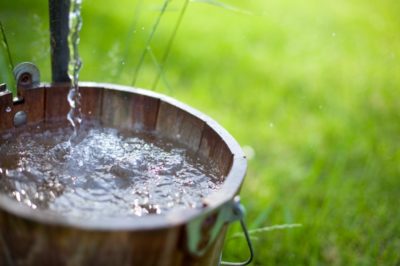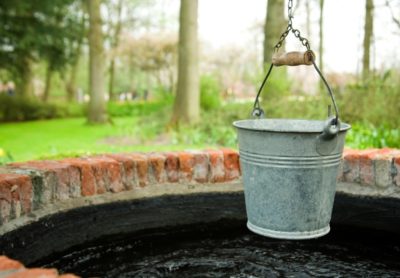 [1]When looking to purchase a home in the country, there are a number of factors that you need to consider — many that urban dwellers need not concern themselves with. One such factor is water supply. You can never be too safe when it comes to water quality for yourself and your family; water is indeed a precious resource.
[1]When looking to purchase a home in the country, there are a number of factors that you need to consider — many that urban dwellers need not concern themselves with. One such factor is water supply. You can never be too safe when it comes to water quality for yourself and your family; water is indeed a precious resource.
While a properly producing well can provide some of the best-tasting water you have ever had, a well that is not operating properly can pose a serious health hazard.
Prevention is always best
Like anything, prevention is always best when dealing with a well and septic system. Although prevention will not keep all problems at bay, it is a good place to start. When you are looking to purchase a home, it is of paramount importance to known as much about the land as you can. This includes knowing the condition of the existing well. If building in a very rural location, first drill the well before building the house. If the home is already built, do not make a final purchase until you have the well checked by a professional.
Types of wells
Most wells today are drilled by heavy and very precise, truck-mounted machinery. Dug wells that have been constructed by hand or using power equipment can be found in older homes but are not often constructed this way since there are more sophisticated methods available.
Common well problems
Here are just a few things that can go wrong with a well. Homeowners are wise to educate themselves before a problem happens so that they can make a quick diagnosis and initiate the necessary repairs to reestablish a safe water supply.
Loss of water
Drilled wells don’t usually go dry. Most often what happens is that the pump is not set very deep and when water levels drop, the pump begins pumping air. Sometimes, the pump can’t do its job if the pump intake is clogged with debris. The only way to solve this problem is to shut the pump down, remove clog if needed and let the well recover.
Dug wells are generally as deep as drilled wells, and can also be poorly constructed. This makes them easily influenced by seasonal drops in the water levels or drought. To avoid this problem, it is best that dug wells be constructed by a professional during times when water levels are low so that they are deep enough to continue to produce water all season long. If you have a dug well that goes dry, the best solution is to drill a new well that is deeper and penetrates below the bedrock surface.
If homes are constructed close together and all have wells, the water level can be lowered simply by use. In addition, when domestic wells are constructed close to larger wells used for industrial, municipal or agricultural purposes, it can also put a strain on the water table. It pays to be cautious of this if you plan to buy or build in such an area.
Water quality
Some issues with water quality are the result of human interaction while others occur naturally.
 [3]Hard water: Hard water contains dissolved magnesium and calcium ions. When you wash clothes in hard water, they often feel hard and scratchy and dishes may be spotty when dry. Hard water can eventually clog drains and damage water pipes. There are a number of ways that you can soften hard water, the best being the installation of a home water softening system or a magnetic water conditioning system.
[3]Hard water: Hard water contains dissolved magnesium and calcium ions. When you wash clothes in hard water, they often feel hard and scratchy and dishes may be spotty when dry. Hard water can eventually clog drains and damage water pipes. There are a number of ways that you can soften hard water, the best being the installation of a home water softening system or a magnetic water conditioning system.- Contamination by salt: During the winter months, many roads are coated in salt or a salt and sand mixture. Salt easily dissolves in water and makes its way into streams and lakes and eventually into ground water. In addition, large piles of salt that are not covered run off and contaminate aquifers and wells. If your well becomes contaminated with salt, the best solution is to install a new well uphill and away from drainage.
- Methane gas: Flammable gas inside a well, well pump enclosure and even a basement is a serious hazard to well owners. Although in some cases, gas dissipates after a well is installed, other places battle a constant supply of methane. Because it is flammable and odorless, a vent is necessary to prevent an explosion. It is also advised never to build a home over a well.
- Oil: Spilled oil fuel can contaminate wells. Many rural homes have fuel tanks underground or close to the home, making leaks a risk. Homeowners who experience an oil leak may be able to slow their pumping speed, which reduces the drawdown. Oil will float on top of water, above intake area. However, by far the safest thing to do in the case of an oil leak is to drill a new well.
- Bacteria: Bacteria contamination from septic tanks is a very common rural well problem and can be quite dangerous. In addition, if rural homeowners dispose of other waste products, including toxic materials into their septic system, these chemicals can accumulate in the aquifer. Deep wells are less likely to draw septic waste.
- Fertilizers and pesticides: Recently, there has been an increase in the number of large pieces of once agricultural land being sold for residential purposes. Homes are built on land where chemicals were once used or close to a location where they are presently used, and are a threat to water quality. No one knows for sure how long these chemicals remain dangerous, how long they take to seep into the soil or water, or how long they take to decompose.
- Animal Waste: If your well is downhill from a barnyard or place where animals are kept, animal waste runoff poses a serious threat to your water quality. Many older farmsteads placed the water supply uphill from animal pens. However, there are many cases today where water supplies are not carefully placed, resulting in contaminated wells. To remedy the situation, animal waste can be redirected or a new well should be dug.
Testing water
Many banks and lenders require buyers to have a well check which shows that the water is safe prior to obtaining a mortgage. Oftentimes, if bacteria is found, the water is chlorinated.
Ultra-Efficient Water Filter Fits In Your Pocket! [4]
Although this will solve the problem in the short term, if the source of the bacteria or contamination is not addressed, the problem will return. This means that a well that is bacteria-free shortly after treatment may not remain so in the long run. A better solution is to chlorinate water that is pumped from the well. If this is not done, a new and deeper water source should be obtained.
Know what the land was previously used for
It is very important to know what the land that your home or prospective home may sit on was used for in the past. Many home sites were once commercial and industrial dump sites. There is also a risk in building on or buying a home that sits on land previously used for orchards or other crops. Chemicals can remain in the soil and shallow ground water for a very long time.
Before purchasing a home in a rural area, it is very important to know the quality of the well, the well water and the waste-disposal system. Be sure that you see a copy of the well record that describes the type of material that the well digger encountered as well as information about the yield.
Many problems with wells are related to older wells and septic systems and also with dense housing developments. Drilled or deep wells are generally safer than shallow water sources. Be sure that the company that you have dig your well is knowledgeable of the area and can place the well in the best location on your land.
Being educated, informed and observant can save a whole lot of time and money when it comes to owning a well.
What tips or questions about wells do you have? Share them in the section below:
Get $600 Worth Of Survival Blueprints … Absolutely Free! [5]

